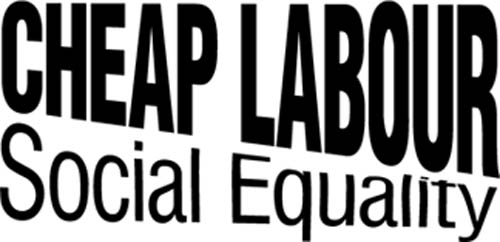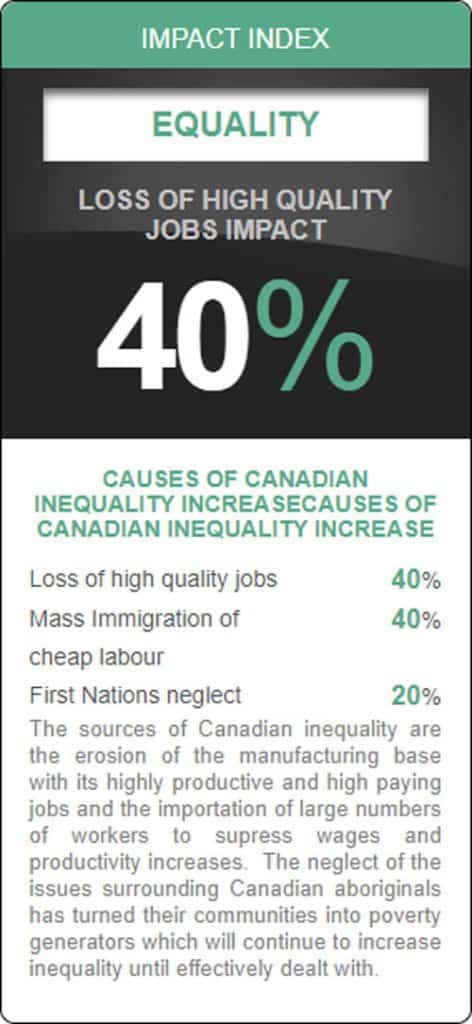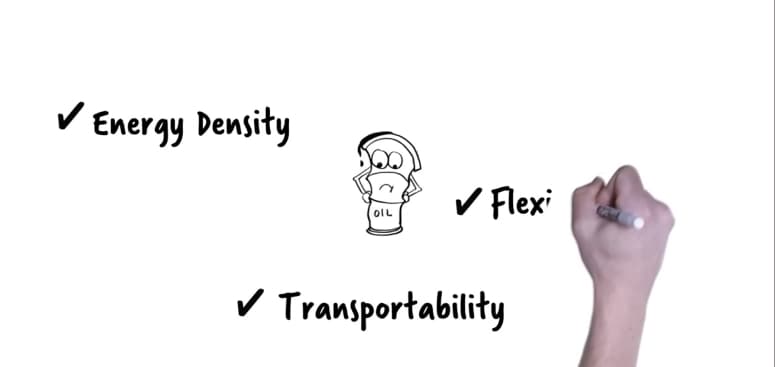The issue of social equality is a more sophisticated form of the income polarization discussion which has been so prominent over the past several decades.
The decline of the middle class and the rapid increase in the number of working poor has been accompanied by the emergence of a small number of super-rich individuals resulting in a far less equal society.
The equality discussion considers the effects of these trends not just from the point of view of the poor but from an overview of society as a whole.
Equality directly impacts:
- Health
- Crime
- Fiscal balance
- Social cohesion
- Quality of life
What equality research has recently revealed is how profound the negative effects are on all levels of society as disparity grows. Wealthy people in a richer society with a high level of disparity have a lower quality of life than less wealthy people in a less rich but more equal society.
In the early ‘60s, Canada had the second-lowest level of inequality in the world. In 2016, we rank around number 20.
Equality affects us all and higher levels of equality should be a national priority.
The equality issue is very well covered by THE SPIRIT LEVEL by Authors Richard Wilkinson and Kate Pickett.
This book carries a powerful message. It demonstrates that the prevalence of negative health and social issues in developed countries are strongly related to the degree of economic inequality.
At one extreme of unequal societies are The United States, Portugal, UK, Singapore and Australia. At the other extreme are the most equal societies, Japan and the Nordic countries, particularly Finland, Sweden and Norway. Canada is in the middle, between the two extremes.
The problems, for which there is reliable data in developed countries, are the following:
- Level of trust
- Mental illness (including drug and alcohol addiction)
- Life expectancy and infant mortality
- Obesity
- Children’s educational performance
- Teenage births
- Homicides
- Imprisonment rates
- Social mobility
Key conclusions:
The absolute level of wealth is irrelevant. It is the difference in levels of wealth in a particular society that matters. e.g. Greece has a per capita GDP less than half of the US, and spends less than half than the US spends on health care, but scores much better than the US with respect to the incidence of health and social maladies.
It is not only the poor in less equal societies who are negatively affected. While they are the most affected, the middle class and the wealthy are also worse off than their equivalents in more equal societies.
In addition to comparing countries, the authors also compared the states within the United States. The same patterns were reflected, with the least unequal states Minnesota, New Hampshire, Vermont and North Dakota always scoring much better than the most unequal states Mississippi, Louisiana and Alabama.
The frequency of problems is also shown to have dramatically increased within developed countries as income equality has worsened since 1970.
The effects are not trivial, they are enormous! Typically, the incidence of any problem is three to ten times higher in the most unequal as compared to the most equal societies. Across whole populations, rates of mental illness are five times higher in the most unequal compared to the least unequal societies. Similarly, in more unequal societies people are five times as likely to be imprisoned, six times as likely to be clinically obese, and murder rates may be many times higher.
While life expectancy increases in the early stages of economic development, in rich countries there is no relationship between per capita health spending and life expectancy.
The status of women is better in more equal societies, there is less violence, people trust each other more, punishment is less harsh, community life is stronger and social relations are less hostile.
Continuing economic growth in the developed world no longer improves health, happiness or other measures of well-being. It does lead to further environmental damage, global warming and increasing disparities with the developing world.
People work much longer in more unequal societies, the equivalent of two to four extra months a year.
Unequal countries spend much more per capita on advertising, with the US and New Zealand spending twice as much as Norway or Denmark.
The growth in inequality makes it harder for people to maintain standards relative to others. The consumption of the rich reduces everyone else’s satisfaction with what they have, by showing it up as inferior, this dissatisfaction is a cost which the rich impose on the poor.
Pressure to consume leads people to save less and to borrow more. Credit card and mortgage debt soared and contributed to the recent economic collapse.
The sad thing is that most people have an intuition that inequality detracts from their quality of life, but they are trapped by the social and economic systems in which they live. It is clear that endless growth is impossible and that humanity must change course. Henry Wallich, an economics professor at Yale said; growth is a substitute for equality of income. So long as there is growth there is hope, and that makes large income differentials tolerable. Fortunately, the relationship holds true in the other direction; Greater equality makes growth much less necessary and is a precondition for a steady state economy.
People seek more money to improve their self-image and their status with respect to others. A survey asked people if they would prefer to be less well off in a rich society, or have a much lower income in a poorer society but be better off than others. Fifty percent said they would trade as much as half their real income if they could live in a society in which they would be better off than others.
The picture is clear. The studies reported in this book show that we are inclined to concern ourselves with particular problems and their possible solutions. It is as if we are concerning ourselves with the symptoms rather than the disease. The authors say: Rather than reducing inequality itself, the initiatives aimed at tackling health or social problems are nearly always attempting to break the links between social economic disadvantage and the problems it produces. The unstated hope is that people, particularly the poor, can carry on in the same circumstances, but will somehow no longer succumb to mental illness, teenage pregnancy, educational failure, obesity or drugs.
Attempts to deal with health and social problems through the provision of specialized services have proved expensive and, at best, only partially effective.
Other services, such as social work or drug rehabilitation, exist to treat, or process their various client groups, rather than to diminish the prevalence of social problems.
When government agencies announce policies ostensibly aimed at decreasing obesity, reducing health inequalities, or trying to cut rates of drug use, it usually looks more like a form of window dressing, a display of good intentions, intended to give the impression of a government actively getting to grips with problems. (e.g. the war on drugs and the politically generated fear of crime)
It is interesting that equality can be achieved by very different methods in different societies. Japan has low taxes but smaller differences in pre-tax incomes. Sweden has large differences in pre-tax incomes but high levels of redistributive taxes. They both achieve relative equality and similar low levels of social and health problems.
If everyone understood and appreciated the messages contained in this book, one might hope that they would support measures to achieve greater equality, even at some economic cost to themselves and whatever their political allegiance.
The authors have set up Equality Trust with a website www.equalitytrust.org.uk All the tables contained in the book are available there as are other resources. There is a very good interview with the authors at the Home Page, click on: See the evidence. Scroll down to see the interview.
A sustainable society must maintain a very high level of equality to avoid the social tensions, mis-allocation of resources and turmoil that inevitably accompany severe and worsening income polarization.
- CBC – The spark that lit riots in Britain last week is rooted in the government’s radical alteration of the social contract with its citizens
- CFIB – A Comparison of Public-sector and Private-sector Wages
- CBC – Half of First Nations children live in poverty
- Canadian Centre for Policy Alternatives – A major report by CCPA Senior Economist Armine Yalnizyan shows Canada’s richest 1% enjoy more of the gains from economic growth than ever before in recorded history
- Global Footprint Network – The United Nations’ Human Development Index (HDI) which measures a country’s average achievements in the areas of health, knowledge, and standard of living, tells us that an HDI higher than 0.8 is considered high human development
- Globe – Half the workforce in precarious employment
- Globe – Canadian-born visible minorities earn less
- CNN – The wealth gap in the United States has grown wider in the wake of the Great Recession, with black and Hispanic American households faring much worse than white households
- CNN – Social scientists have long said income inequality is bad for society. Yet popular measures of social stability — crime rates, voter non-participation — have been going down over the last couple of decades
- Vanier Institute – The Health of Families in Canada
- Harvard – Fred Solt’s – The Standardized World Income Inequality Database
- Globe – Toronto is becoming a city of stark economic extremes as its middle class is hollowed out and replaced by a bipolar city of the rich and poor
- Wolfram – Inequality Stats – Wolfram|Alpha introduces a fundamentally new way to get knowledge and answers? not by searching the web, but by doing dynamic computations based on a vast collection of built-in data, algorithms, and methods
- Conference Board of Canada – Is Canada becoming more unequal?
- CIBC – Quantity and Quality of Jobs Falling in Tandem
- Fred Solt – The Political & Social Consequences of Economic Inequality – Fred Solt
- Globe – A majority of Canadian employees are living paycheque to paycheque and report they would be in financial difficulty if their pay were delayed by even a week
- Financial Post – Financial Inequality Could be Growing Faster than Figures Suggest




